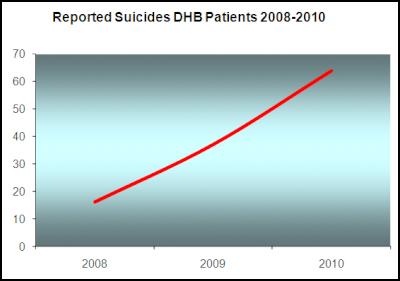Serious & Sentinel Reports and Suicide
Press Release 18 November 2010
Support group for families bereaved by suicide CASPER (Community Action on Suicide Prevention, Education and Research) is angry at the casual way in which the steep rise in suicides of those under the care of DHBs is being treated.
Yesterday’s release of the Health Quality & Safety Commission’s report on Serious and Sentinel Events 2009/2010 showed that 50% of reported deaths of patients under DHB care were from suicide.
Of equal concern to CASPER is that figures show a 300% increase in suicides of those under the care of DHBs since 2007/08 from 16 in 2007/08 to 64 in 2009/10.

The figures support the report last month of the Director General of Mental Health that those under the care of Mental Health Services are 25 times more likely to commit suicide than those who do not seek treatment. The Director General’s report shows the rate of suicide for those receiving treatment is 303 per 100,000 of population while the rate for those not being treated is 5 per 100,00.
“Those of us who have lost a loved one to suicide know that the widespread use of antidepressants and other dangerous psychotropic drugs in New Zealand DHBs is what accounts for the difference. These drugs come with a warning in the United States and other countries that they can worsen depression, induce suicidal thinking and behaviour and cause cardiac arrest. In New Zealand they come with no warnings at all” said Maria Bradshaw, spokesperson for CASPER.
Chair of the Interim Board of the Commission Professor Alan Merry notes in the introduction to his report that “the occurrence of the same types of event over and over again strongly suggests problems that lie primarily in the systems and processes used in providing health care.”
“It is telling that in the ‘learning from reporting’ section, suicide is the only event which is not covered by examples of initiatives implemented in DHBs to reduce the incidence of serious events.” said Ms Bradshaw. “While the evidence that current treatment approaches actually increase suicide rates is mounting, DHBs increase their use of these approaches and go unchallenged by those responsible for holding them accountable.
A WHO sponsored research report published on CASPER’s website reviewed 100 countries around the world and concluded that those that introduce mental health initiatives as a suicide prevention measure actually increase rather than decrease their suicide rates.
An article authored by Professor Merry and published in the New Zealand Medical Journal in 2008 notes that Preventable adverse events involving medications have been repeatedly identified as a leading cause of iatrogenic harm internationally. It states that there is no point collecting information without acting upon it and that reluctance over patient safety initiatives sometimes reflects denial that a problem exists.
CASPER believes that Professor Merry however is guilty of exactly those things. The press information accompanying his report’s release said he believed that “the increase is due to the fact that we are getting better in recognising and reporting, rather than an increase in the number of preventable event(s).” CASPER considers it highly unlikely that the 300% increase in suicides is due to DHBs better identification and reporting of these deaths. “When someone kills themselves it’s a pretty major event and not easy to miss” says Ms Bradshaw. “Is Professor Merry really suggesting that DHBs were unable to recognize a suicide in 2007 but have suddenly developed that ability in 2010. The group notes that other reportable events have only increased 30% over the 3 year period.
CASPER
CASPER (Community Action on Suicide
Prevention, Education and Research) is a not for profit
organization, established on 12 August 2010.
It was established by two mothers who lost children to suicide in 2008 and provides a network for families bereaved by suicide around New Zealand.
Information on the group is available at www.casper.org.nz and on the linked facebook page.
ENDS


 NZ Symphony Orchestra: NZSO To Tour Masterworks By Mozart, Beethoven, Haydn And More
NZ Symphony Orchestra: NZSO To Tour Masterworks By Mozart, Beethoven, Haydn And More Journal Of Public Health: Vape Shops Cluster Around Schools
Journal Of Public Health: Vape Shops Cluster Around Schools Timaru District Council: Aigantighe Art Gallery Hosts An Iconic Robin White Touring Exhibition
Timaru District Council: Aigantighe Art Gallery Hosts An Iconic Robin White Touring Exhibition Victoria University of Wellington: Dame Winnie Laban Awarded Honorary Doctorate Recognising Achievements For Pasifika
Victoria University of Wellington: Dame Winnie Laban Awarded Honorary Doctorate Recognising Achievements For Pasifika  HESSA: This Isn’t Fair—And It’s Time To Fix It - HESSA Petition Calls For Inclusive Student Sports
HESSA: This Isn’t Fair—And It’s Time To Fix It - HESSA Petition Calls For Inclusive Student Sports Post Primary Teachers' Association: PPTA Calls On Minister Stanford To Come Clean On Kāhui Ako
Post Primary Teachers' Association: PPTA Calls On Minister Stanford To Come Clean On Kāhui Ako 